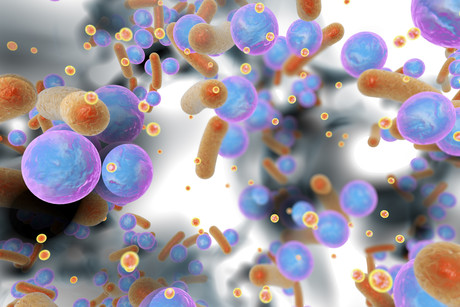Harmful bacterial biofilms targeted by researchers

A new manufacturing research partnership is aiming to develop solutions for harmful biofilm infections.
Over four years, $3.5 million will be co-invested in the project by the Innovative Manufacturing Cooperative Research Centre (IMCRC), University of Sydney and medical and industry manufacturer Whiteley Corporation.
The research will be led by Dr Jim Manos and Dr Theerthankar Das from the Central Clinical School’s Discipline of Infectious Diseases and Immunology in the university’s multidisciplinary Charles Perkins Centre, and Dr Trevor Glasbey and Dr Greg Whiteley from the Hunter-based Whiteley Corporation.
Biofilms formed by bacteria on living tissue cause morbidity and mortality in humans and animals. They also form on inanimate medical-related surfaces such as catheters, implants, medical instruments and almost all dry surfaces, where they pose a significant infection risk for patients. Biofilms can also be found on non-medical surfaces such as in pipes and on boat hulls, are expensive to remove and cause damage to surfaces.
Announcing the grant and the research agreement, Whiteley said the work would be of major medical significance worldwide.
“Bacterial biofilms cause both human disease and death, and these microbes are also responsible for contamination in industrial and institutional settings,” he said.
“This manufacturing research project aims to commercialise a series of combination therapies being developed in collaboration with the University of Sydney, arising from early findings by Dr Manos and his team.”
Manos, a Senior Lecturer in Infectious Diseases at the university, thanked the IMCRC and Whiteley Corporation and said the partnership would expand on the work of Dr Das, a university postdoctoral fellow who developed a three-part treatment to tackle bacterial biofilms called combination therapy.
“This project will demonstrate how combination therapy can be used to effectively disrupt the formation of biofilm and eradicate underlying bacteria found in the lungs of cystic fibrosis patients, chronic urinary tract infections, diabetic leg wounds, burn wounds, dry and wet surfaces, the food industry and industrial oil, gas and water pipes,” he said.
“We will bring products to market through the development and application of innovative manufacturing technologies that improve biofilm removal — both in areas of medical importance to improve the lives of people worldwide and in industry to achieve less waste in food production and savings in the cost of transported liquids.”
IMCRC CEO and Managing Director David Chuter said that incorporating advanced manufacturing technologies and processes into the project will be crucial to successfully commercialise the new formulated products.
“This project takes a new approach to resolving biofilm problems. Applying advanced manufacturing techniques and automating key functions of the formulation development and production process right from the start will provide operational efficiencies and drive commercial outcomes,” said Chuter.
“It is great to see a local manufacturer such as the Whiteley Corporation embrace research innovation and invest in advanced manufacturing technologies that will not only benefit the human health sector, but also the manufacturing community in the Hunter Valley.”
The partnership follows an initial grant from the university’s Commercial Development and Industry Partnerships (CDIP) Industry and Community Engagement Fund and the Whiteley Corporation, used to develop the data for the successful IMCRC submission.
$1bn vaccine and antivenom manufacturing facility opens
A $1 billion cell-based influenza vaccine and antivenom manufacturing facility has opened in...
National concussion clinical guidelines now available
The first Australia- and New Zealand-specific guidelines for all forms of concussion — from...
Doctors criticise "risky prescribing agenda"
The AMA and RACGP have expressed disappointment in the Pharmacy Board of Australia's...




![[New Zealand] Transform from Security Awareness to a Security Culture: A Vital Shift for SMB Healthcare — Webinar](https://d1v1e13ebw3o15.cloudfront.net/data/89856/wfmedia_thumb/..jpg)
![[Australia] Transform from Security Awareness to a Security Culture: A Vital Shift for SMB Healthcare — Webinar](https://d1v1e13ebw3o15.cloudfront.net/data/89855/wfmedia_thumb/..jpg)



